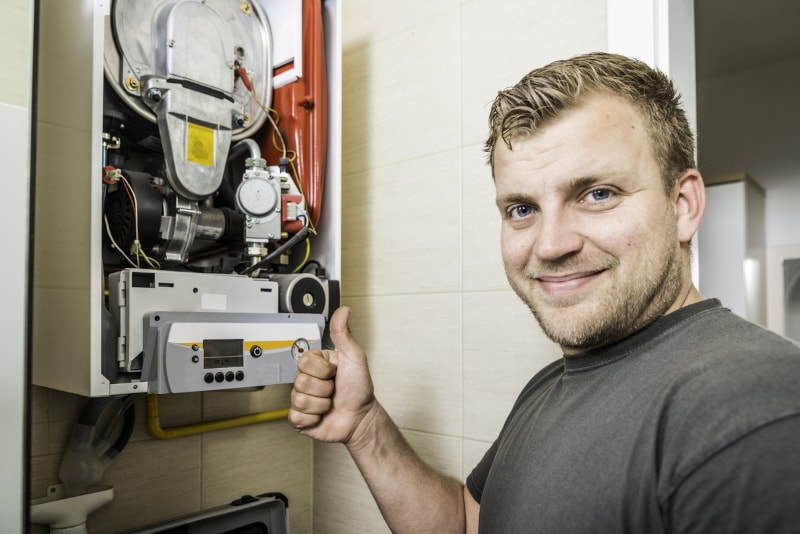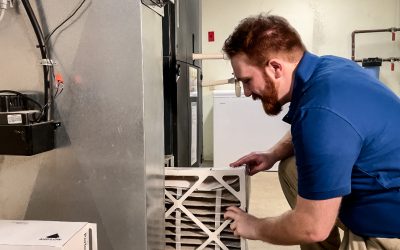Most homeowners know what their HVAC system is and a few troubleshooting fixes, such as changing the filter and basic seasonal upkeep. Past this, it is time to partner with an HVAC company.
Because of limited knowledge of HVAC systems, the company you work with must be of the highest integrity. When you have a trusted relationship with your technicians, you can take their advice to heart with system suggestions and maintenance plans. If you feel that the company is just out to upsell you, even sound advice may be brushed aside due to distrust.
But… what makes a contractor dependable or not? What red flags should you be aware of when researching HVAC companies? Are there any questions or steps you should ensure are covered?
This article has you covered for choosing your HVAC contractor.
Qualities of a Good HVAC Contractor
Any company can claim to “be the best in the business,” but excellent HVAC companies have the background to support that claim. It is one thing to say something and quite another to “walk the walk and talk the talk.”
Licensing and Certification
Right away, your HVAC company should reassure you they know what they are doing by providing licensing and certification, including proof of insurance and bonding.
We have all heard the tree-cutter disaster stories. Someone knocks on your door and offers to take care of the tree in your backyard that has been slowly dying for the last three years. You agree, and one lousy cut later, the tree is through the roof. The tree cutters pull a Houdini and vanish. You are stuck with a half-cut down tree and a nice opening to catch the rain.
HVAC units deal with air exchange, chemicals, and carbon monoxide. Don’t let just anyone work on your unit! After you receive their credentials, follow up on it. Most reputable contractors carry NATE (North American Technician Excellence) Certification, which ensures technicians are tested on specialty areas, show expertise, and are committed to excellence.
Depending on your HVAC need, different credentials may be required. For example, refrigerant requires an EPA 608 certification. If you are unsure of what certification is needed for your specific repair, check with your local licensing department.
As in the example above with the tree, you must ensure that your company provides bonded technicians who are covered under insurance. Do not take their word on it – ask for proof or a copy of the insurance. If the quality of work is subpar or there is damage to your home, this step provides you with a layer of protection. A reputable company will already have this in place, as they also want to protect themselves from liability.
Finally, certain companies work as factory-authorized dealers. As such, specific training is necessary to be considered a factory-authorized dealer. Check if your HVAC technician and company work as a factory-authorized dealer. ARE THEY TRANE AND MISTUBISHI FACTORY AUTHORIZED DEALERS
Never be afraid to ask for credentials. Any reputable contractor or company will gladly provide you with their licensing paperwork, proof of insurance, or training.
Experience and Expertise
A top-of-the-line HVAC system doesn’t matter if it is installed incorrectly or the company servicing it is too unfamiliar to do so correctly, risking mistakes that lead to future repairs.
When assessing which company you are selecting as your HVAC company, ask how long they have been in business, how many years of experience the technician working on your system has, how the company keeps up with changes in the HVAC industry and current technology, and how are the technicians trained?
Because HVAC systems come with a myriad of specialized services, consider how varied the company’s experience is. They may have decades of background with central heating systems but have yet to install mini-splits. Ask about the assortment of systems your potential company has worked with.
At Leckron’s Comfort Solutions, our owner has over 22 years of experience – having gone to Pennsylvania College of Technology for Heating and Air Conditioning Technology from 1999-2001. Our company was founded 15 years ago. Our expertise covers many areas, and we are committed to learning and growing as new technologies develop.
Reputation and References
When making a financial decision as substantial as selecting your HVAC company, it pays to do your homework… and that doesn’t mean just relying on the hand-selected reviews and referrals from the company. While these are helpful, they are also specifically chosen to reflect highly.
Look for online testimonies. You should find a range of reviews when you Google the company’s name. Look up company reviews on The Better Business Bureau. Ask friends and family for reviews both on personal technicians and companies. Note how the company responds to low reviews and if resolutions were attempted.
Professionalism and Communication
In a service industry, you should expect a high level of professionalism. Even though HVAC can be a dirty job, your technician should still maintain professionalism, including dress and how they treat your home. Any mess made while installing your system should be cleaned before the technician leaves.
In all communication, there should be a high level of professionalism both in written and spoken word. Quotes should be clearly written, and questions addressed without scorn, sarcasm, or defensiveness. When paying for a service, the customer should be comfortable with the purchase, allowing them to ask anything that causes hesitation or concern.
While it is unreasonable to expect an instant response, there should be fairly prompt replies. It is a red flag if you never can get a return call or email. What would happen should you have an emergency?
Warning Signs of a Bad HVAC Contractor
One piece of advice about relationships is it’s not just important to know what you want; it is almost equally, if not more, important to know what you do not want. Your relationship with an HVAC company or contractor aligns with this guidance. Know the red flags of a subpar contractor.
Lack of Proper Credentials
While the good part of us – the part that has known we benefited from people believing in us – wants to give new technicians a chance… when it comes to our HVAC system, you cannot take chances on unlicensed contractors. The risks are far too significant to gamble on.
Aside from poor quality work, you take personal risks hiring an unlicensed person. You may be liable for their injuries if they should get hurt while working on your premises. On a purely system level, your warranty may be void if installed by a technician who lacks the proper credentials.
In Pennsylvania, all contracts, advertisements, proposals, and estimates must include the contractor’s registration number. If you ask for a permit, proof of license or registration, and proof of insurance and the contractor balks, refuses, or wishes to start on the work before showing you – do not let them. These are all red flags, and you could be stuck with the expense.
Inadequate Experience or Training
At some point, a new HVAC technician needs experience to perform a job well. Most reputable companies will have a new technician train with experienced technicians until they are well-versed in identifying issues, fixing problems, and understanding a range of systems and their unique needs.
When you hire an inexperienced technician, you are not just putting your system at risk of breakdown or missed troubleshooting; you are putting your family in harm’s way. HVAC systems intertwine electrical and gas components. If these are not correctly installed or troubleshot, fires, gas leaks, or expensive repairs could occur.
Ask questions about the technician’s experience, what they typically see, and the general cost range. You can naturally get an idea of the experience of a contractor by the reply. Ask about energy efficiency, time before repairs or replacement, cost savings, and comparable products. Again, the experience a contractor has will show with these inquiries.
Poor Customer Reviews and Ratings
When searching for reviews online, be wary of a stranger’s words. Not all negative reviews are fair, and not all positive reviews are honest. First, watch the way a company replies to a negative review. Are they bitter or helpful? Do they attempt to rectify the situation or brush off the concern? Does the review mention another company? This technique is often a ploy of competitors to try to drive service to them.
When looking at positive reviews, are they specific? Most reviewers will give details about the service they received – they often mention detailed information that shows the service actually happened. A bunch of vague reviews is a tip they may be fake.
Also, scrutinize dates. Are most current reviews positive, but some from 10 years ago may have been negative? The company may have made changes that caused the service to improve. Same with the opposite. A small company may not have thousands of reviews but may have better service than a larger company.
Unwillingness to Provide References
Reputable companies have a variety of references. If they are a niche company only working with a specific clientele, they may not have business and residential experience. However, they still should have various experience with products and services.
References should be readily available. Experienced companies are accustomed to being asked to provide this information. If they don’t have it on hand, it should take little time to compile it for you. Any hesitation to share this is a red flag.
Price-Driven Decision-Making
We all want the best price possible; however, the lowest price doesn’t always mean the best service. Get a variety of quotes – they should be in a general ballpark.
The lowest price also does not mean the most comprehensive – it could have hidden fees and fine lines attached. The highest quote isn’t always the best quality of work or the most expensive if it includes all “additional” fees.
Watch for down payments. In Pennsylvania, contractors should not ask for more than ⅓ of the price of the total project as a downpayment.
Finally, if you are approached by door-to-door salesmen, despite what savings they offer if you sign up today, be wary.Low prices from door-to-door salesmen can be possible due to poor quality materials or uninsured contractors. Do not hire on the spot – do your research.
Essential Questions to Ask Potential Contractors
Having a checklist of questions to ask any contractor or HVAC company helps you approach your decision methodically versus emotionally or based on a good sales pitch. Here are Leckron’s recommendations for asking an HVAC company or contractor:
- Are you licensed and insured?
- How many years of experience do you have?
- Can you provide references from previous clients?
- Do you offer warranties or guarantees for your work?
- How do you handle unexpected complications or changes?
- Will you provide a written estimate and scope of work?
- What is your approach to energy efficiency and environmental concerns?
The Importance of Written Contracts
Contracts should protect both the customer and the company or contractor. They are written in a way to legally cover both parties. Make sure to read through and understand the fine lines of a contract before agreeing to the work. Do not hesitate to ask questions on any confusing parts. You are the customer and deserve to understand any agreement before deciding on it.
Elements of a comprehensive HVAC contract
- Details about the company: at a minimum, these would include the company’s legal name, address, contact information, and, in Pennsylvania, the contractor’s registration number.
- Payment terms: this should include all information about when payment is due. Is there a deposit required, and by when? Is there a payment schedule in place? What type of payment is accepted, and where should it be remitted?
- Timelines: the contract should estimate when the work will take place and how long it will take to be completed, given no unexpected issues arise.
- Task list: these are details of what the technician will do while on your job. This will change depending on the service provided. Still, you should know what will be inspected, replaced, or serviced with your job.
- Contingency clauses: these clauses detail the rights and obligations of both the customer and the contractor. Examples are liability protection for damages caused by the contractor, termination clauses allowing either the contractor or customer to end the agreement, or indemnification clauses protecting the contractor from damages caused by misuse on the customer’s part.
- Time and material Rates: this should clearly break down the hourly rate and material fees for the service, supplies, and parts.
- Perks: if there are discounts on materials or future services, financing options, or maintenance contracts following installation, these should be detailed here.
- Laws: state laws spelled out on the contract help all parties stay aware of rights and responsibilities under the agreement.
Trusting Your Instincts: The Final Decision
Through the whole process, do not discredit your intuition. Our gut feelings are often a useful gauge for when something feels a little too good to be true or a contractor is a bit shady.
When you take a very impartial approach to sorting through options – looking at the facts of the quote, references, reviews, experience, and interactions with the contractor – you get a sound impression of the company.
If you are doubting yourself, seek a second opinion. Asking friends and family for their impressions helps, as they are not financially invested in the options and can often provide an unbiased view of your options.
At Leckron’s Comfort Solutions, we are not just concerned with the comfort of your home but also the comfort in your decision. We understand partnering with an HVAC company is a consequential decision, and it matters you trust the recommendations of your technicians.
We also recognize that emergencies happen, and you need to know the contractor you work with is not taking advantage of you in a critical situation. At Leckron’s, we want you to know what to expect, that you are met with professionalism and care, and the quality of the work surpasses your expectations.
Installed Mitsubishi unit for heating and cooling – great team of installers done very quickly and cleanly even though it was raining and muddy outside where the base unit was installed. –Richard L., Customer
There’s a reason our company is a favorite of Pennsylvania families. Discover why our customers depend on Leckron’s Comfort Solutions for all their HVAC needs. Contact Leckron’s today to discover your long-term HVAC solution.




